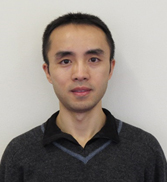Jun Wang, Ph.D.
Associate Professor
Graduate Program Director
Research Focus
 Our lab is primarily focused on advanced single-cell proteomics technologies and single-cell
systems biology. The long-term goal of our research is to implement single-cell proteomics
technologies in the clinic to advance precision medicine and personalized medicine,
and to make treatment outcome predictable. Protein-level signaling and biomarker studies
with the single-cell resolution are expected to address key obstacles in the diagnostics
and therapeutics of systematic diseases such as cancer, sepsis, autoimmune diseases,
Alzheimer’s diseases, and Parkinson’s disease. In particular, we are working on portable
cytometry-like microdevices that exceed the power of existing cytomters. Since the
size of animal cells is at the micro scale, microchip platforms are employed to facilitate
single-cell manipulation and biomolecule detection. Those microdevices are fabricated
in our lab by photolithography. Integration with a highly multiplexed, miniaturized
biosensor array into the microdevices enables assays of both secreted cytokines, membrane
proteins and intracellular proteins from individual cells.
Our lab is primarily focused on advanced single-cell proteomics technologies and single-cell
systems biology. The long-term goal of our research is to implement single-cell proteomics
technologies in the clinic to advance precision medicine and personalized medicine,
and to make treatment outcome predictable. Protein-level signaling and biomarker studies
with the single-cell resolution are expected to address key obstacles in the diagnostics
and therapeutics of systematic diseases such as cancer, sepsis, autoimmune diseases,
Alzheimer’s diseases, and Parkinson’s disease. In particular, we are working on portable
cytometry-like microdevices that exceed the power of existing cytomters. Since the
size of animal cells is at the micro scale, microchip platforms are employed to facilitate
single-cell manipulation and biomolecule detection. Those microdevices are fabricated
in our lab by photolithography. Integration with a highly multiplexed, miniaturized
biosensor array into the microdevices enables assays of both secreted cytokines, membrane
proteins and intracellular proteins from individual cells.
One of the particular interests in our lab is single-cell analysis of cytokine production that is highly related with immunological disorders, tissue regeneration and neurodegenerative diseases. For example, neural repair process involves delicate regulation of progenitor cell differentiation by environmental factors which are mostly proteins. We have developed multiple strategies to detect a few cytokines simultaneously from the same single cells. A wash-free, fluorogenic sensor based on click chemistry has been invented to rapidly detect cytokines with only one step. A multiplex in situ tagging (MIST) technique has been implemented on barcoded microspheres to analyze dozens to hundreds of proteins from single cells. Through enormous efforts, we hope to make ultra-high multiplex single-cell technologies accessible and affordable to the broad biomedical world.
Education
- Postdoctoral fellow - Chemistry, California Institute of Technology
- Ph.D. - Biological Engineering, Purdue University
- M.S. - Biochemical Engineering, Zhejiang University
- B.S. - Biological Engineering, Zhejiang University of Technology
Academic Appointments
- 2019 - current: Assistant Professor, Department of Biomedical Engineering, Stony Brook University, New York.
- 2014 - 2019: Assistant Professor, Department of Chemistry, SUNY Albany, New York.
Publications
Click here for Dr. Wang's publication via Google Scholar.
Click here for Dr. Wang's publications via lab webpage.
Courses Taught
- BME 361 – Data Science with Python
Funding Agencies
- National Institutes of Health - NIGMS
- New York Stem Cell Science (NYSTEM)
